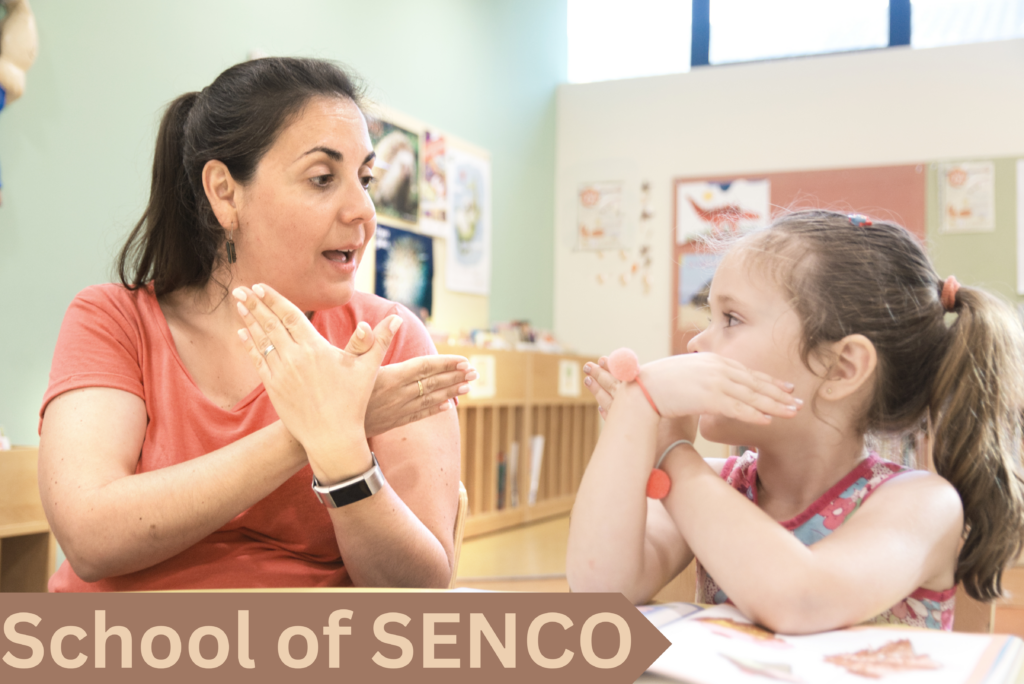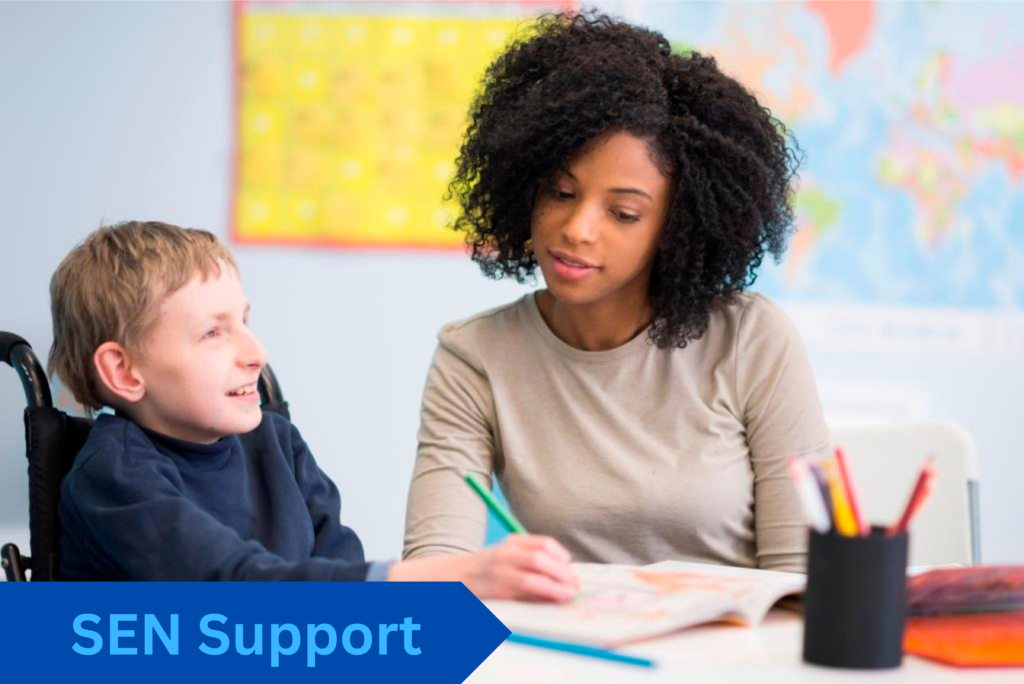What is a SENCO Assistant?
A SENCO assistant is a support role within an educational setting, typically in schools, that assists the Special Educational Needs Coordinator (SENCO) in their duties. The SENCO is responsible for coordinating and overseeing the provision of special educational needs (SEN) support to students who require additional assistance due to learning difficulties or disabilities.
Their primary responsibility is to assist the SENCO in overseeing and coordinating the provision of support for students with special educational needs (SEN). This role involves administrative duties like record-keeping and scheduling meetings with parents and professionals. Additionally, SENCO assistants may directly support individual students with SEN, manage learning resources, observe and report on student progress, facilitate communication between teachers, parents, and external specialists, and engage in training to stay updated on best practises for supporting students with special needs. The specific duties can vary between schools and regions, but collectively, these responsibilities ensure that students with SEN receive the necessary support to thrive in their education.

What is the Role of a SENCO Assistant?
Let’s first clarify the role of the SENCO assistant before diving into how to become one. An essential particular education team member, a SENCO assistant collaborates with SENCOs, teachers, and other experts to foster an inclusive learning environment. The following are some critical duties:
Helping Students: Students with a variety of special educational needs are supported by SENCO assistants. Children with emotional and behavioural difficulties, autism, ADHD, learning disabilities, or physical impairments may fall under this category.
Helping with IEP Development: Individualised Education Plans (IEPs) are essential for adjusting instruction to meet the specific requirements of each student. SENCO assistants contribute to the creation and execution of these plans.
Collaboration: The core of special education is effective teamwork. SENCO assistants collaborate closely with educators, parents, therapists, and other experts to develop a thorough support network for students.
Advocacy: They aid in evaluating and keeping track of pupils’ development, pointing out any areas requiring further assistance or modifications.
How do I become a SENCO assistant?
There are numerous ways to prepare for the SENCO Assistant (Special Educational Needs Coordinator Assistant) post. A relevant educational background, such as a bachelor’s degree in psychology, special education, or a similar profession, can be beneficial. Although it is not always required, this educational foundation gives students with special needs a strong understanding of teaching principles and child development (SEN).
Consider opportunities like working as a teaching or classroom assistant, volunteering in special education programmes, or taking part in internships connected to SEN to gain practical experience. You can also take the SENCO course from One Education.
SENCO Assistants must communicate with various parties, such as students, parents, teachers, and outside experts. Developing administrative and organisational abilities is also essential for this position because it involves managing resources and keeping records, among other things. Your qualifications can be improved by keeping up with SEN practises, pursuing ongoing professional development opportunities, and connecting with others in the education industry.
What subject do you have to study to be a SENCO assistant?
There isn’t usually a particular subject that you need to study to become a SENCO Assistant (Special Educational Needs Coordinator Assistant). Nonetheless, having experience in education or a similar profession is advantageous. Several candidates for this position hold degrees in child development, special education, psychology, education, or a related field. While helping students with exceptional educational needs, these subjects provide a solid basis for comprehending educational concepts, child psychology, and instructional methodologies (SEN).
Even though it’s not always necessary to have a specific degree, having a relevant academic background can help you better comprehend the complexities of the educational system and the wide range of needs of students, which is helpful when assisting the SENCO in coordinating and providing support for SEN students.
Skills and Qualifications of Effective SENCO Assistants
There isn’t usually a particular subject that you need to study to become a SENCO Assistant (Special Educational Needs Coordinator Assistant). Nonetheless, having experience in education or a similar profession is advantageous.
Several candidates for this position hold degrees in child development, special education, psychology, education, or a related field. While helping students with exceptional educational needs, these subjects provide a solid basis for comprehending educational concepts, child psychology, and instructional methodologies (SEN). Even though having a specific degree is sometimes necessary, having a relevant academic background can help you.

What is the School of SENCO?
A school SENCO (Special Educational Needs Coordinator) is a specific training programme or course created to give educators and professionals the information and abilities they need to be successful SENCOs within educational institutions, most often schools. The target audience for these programmes is anyone considering applying for or having already been given the position of SENCO. The training usually covers a range of topics related to special education, such as legal and regulatory requirements, understanding the needs of students with SEND, assessment and intervention tactics, and collaborative working methods with SEND students, parents, and outside specialists. For educators aspiring to or currently serving in the capacity of a SENCO, completing a School of SENCO programme is frequently an essential step because it provides them with the knowledge of SEN education.
Role: The Special Educational Needs Coordinator Assistant (SENCO Assistant) position is crucial to coordinating and supporting SEN services in an educational context, usually a school. These experts collaborate closely with the SENCO to guarantee that students with SEN receive the support and modifications they need to succeed academically and socially. SENCO Assistants frequently do administrative duties like precise record-keeping, organising appointments with parents and specialists, and ensuring that SEN pupils use resources effectively.
Responsibility: A SENCO Assistant, often referred to as a Special Educational Needs Coordinator Assistant, performs various duties crucial for providing practical support for kids with special needs (SEN). These experts are essential to the administrative side of SEN support, coordinating meetings with parents and other professionals, keeping thorough records, and ensuring all SEN-related paperwork is accurate and compliant with laws. Moreover, SENCO assistants are actively involved in helping SEN students by offering support. They carry out the strategies described in Individualized Education Plans (IEPs) or other specialized plans to meet academic and behavioural issues, working alone or in small groups.
Know the Principles and Leadership by SENCO
- Understanding of Special Education Laws and Policies: A SENCO should be well-versed in the special education legislation and regulations that apply to their area of responsibility. Due to their knowledge, they can promote the rights of students with special educational needs (SEN) and guarantee that pertinent laws are followed.
- Inclusive Education Philosophy: A dedication to inclusive education is a core principle of inclusive education philosophy. All kids have a right to access high-quality education in the mainstream classroom, regardless of their talents or disabilities, and SENCOs should advocate for this principle.
- Student Center Approach: Successful SENCOs place a high priority on the needs and welfare of their students. Individualized education programmes (IEPs) and support techniques are developed to meet each student’s particular needs.
- Collaborative Leadership: To build a strong network for supporting SEN students, SENCOs should be joint leaders who work closely with teachers, parents, and other professionals. This calls for successful collaboration among stakeholders, teamwork, and good communication.
- Advocacy Skills: Leadership in special education frequently entails fighting for the needs and rights of SEN children. A SENCO should be able to speak up for kids both on an individual and systemic level to ensure that they get the support and accommodations they require.
- Data-Driven Decision-Making: Successful special education leaders use data and assessments to decide on interventions and support in a data-driven way. They frequently gather and examine data to monitor student growth and change their tactics as necessary
- Empathy and Patience: When interacting with kids, parents, and teachers, SENCOs must exhibit kindness and patience. They ought to be patient when attending to the needs of SEN students and mindful of the difficulties they experience.
- Professional growth: Special education administrators are dedicated to lifelong learning. They keep up with industry best practices, participate in pertinent training and workshops, and support their team’s professional growth.
- Resource Management: SENCOs often oversee the allocation and management of resources for SEN support. This includes materials, assistive technology, and personnel. Effective resource management is essential for providing quality support.
How to apply for jobs as a SENCO Assistant
Follow these steps to apply for positions as a SENCO Assistant (Special Educational Needs Coordinator Assistant):
- Review job requirements and descriptions: Read the job descriptions and requirements for SENCO Assistant roles carefully to understand the position’s unique qualifications, duties, and conditions.
- Update Your Resume and Cover Letter: Update your cover letter and resume.
Ensure that the abilities, knowledge, and experience you highlight on your resume are pertinent to the SENCO Assistant position. Create a cover letter outlining your qualifications and interest in the job.
- Look for Employment: Look for job openings on job search portals, in schools, and in other institutions of higher learning. Start with school websites, educational job placement services, and regional educational authorities.
- Prepare the required paperwork: For your job application, gather any necessary documents, such as references, certificates, and transcripts.
- Apply on the web: The majority of employment applications are made online. To submit your résumé, cover letter, and any other required papers through the school’s or employer’s application site, follow the directions specified in the job advertisements.
- Networking and Referral-Seeking: Ask your professional network, which includes educators, teachers, and others employed in the education industry, about employment openings and possible recommendations.
- Getting Ready for Interviews: If you are chosen for an interview, get ready by learning about the institution’s special education policies, conducting research on it, and practising your responses to typical interview questions.
- Show Off Your Knowledge and Skills: At the interview, make sure to highlight your familiarity with special education principles, your capacity to work with SEN students, your organisational abilities, and your dedication to the achievement of all students.
- Describe your communication abilities in detail: Put a focus on your strong communication abilities, which are essential in this position for working with a variety of stakeholders.
- Ask Questions: Prepare intelligent questions regarding the school’s special education philosophy, the duties of the SENCO Assistant position, and the assistance given to SEN students before the interview.
- Action Plan: Send a thank-you note expressing your appreciation for the opportunity and reiterating your interest in the role after the interview.
- Think about temporary or replacement roles: Consider temporary or replacement employment in schools if you are having trouble finding a full-time SENCO Assistant post to develop experience and network in the industry.
What key skills will you acquire by pursuing SENCO assistant training?
An excellent chance to acquire a variety of critical knowledge and skill sets necessary for successfully supporting students with special educational needs (SEN) is to pursue training to become a SENCO Assistant. Through this training, people are thoroughly aware of SEN concepts, legal issues, and ethical obligations. It focuses on abilities like assessment and evaluation, allowing experts to create individualised education plans (IEPs) tailored to meet each student’s specific needs.
An excellent chance to acquire a variety of critical knowledge and skill sets necessary for successfully supporting students with special educational needs (SEN) is to pursue training to become a SENCO Assistant. Through this training, people are thoroughly aware of SEN concepts, legal issues, and ethical obligations. It focuses on abilities like assessment and evaluation, allowing experts to create individualised Education plans (IEPs) tailored to meet each student’s needs.
Positive connections with teachers, parents, and experts are fostered by emphasising effective communication, collaboration, and teamwork. The effective delivery of support is made possible by skills in resource management, data gathering, and analysis, and a concentration on advocacy guarantees that the needs and rights of SEN students are given priority. Also, the instruction fosters empathy, tolerance, and patience, all of which are necessary for interacting with various student populations. In general, SENCO Assistant training provides people with a well-rounded skill set that enables them to significantly influence the academic trajectory of SEN Students.
Empathy: In SENCO, empathy is an essential skill to be developed. It means the ability to understand students’ emotions and experiences. If a SENCO assistant is good at understanding such facts, then the students will feel more secure with them. So it is important to have a great deal of empathy as a SENCO assistant.
Patience: Patience is vital for a Special Educational Needs Coordinator (SENCO) as they work with students with diverse and sometimes challenging needs. SENCOs must demonstrate patience in understanding each student’s unique circumstances, communicating effectively with students and their families, and implementing strategies and interventions that may require time to yield results. Patience allows SENCOs to provide consistent and compassionate support, fostering a positive and inclusive learning environment for students with special educational needs.
Effective Communication: SENCOs with empathy are better at sensitive communication and active listening. They can build relationships of trust and open communication with children, parents, and teachers, which makes it simpler to handle issues and work effectively as a team.
Adaptability: An essential skill for a Special Educational Needs Coordinator (SENCO) is adaptability, which enables them to fulfil the different requirements of kids with special needs while navigating the always shifting educational landscape. SENCOs must adapt to legislative changes, customise support for specific students, use new technologies, promote inclusive practises, work with interdisciplinary teams, track student development, wisely allocate resources, interact with stakeholders, and handle emergencies well. Since the educational environment is constantly changing, their versatility guarantees that SEN children receive the best support and possibilities for achievement.
Organizational Skills: A Special Educational Needs Coordinator’s (SENCO) ability to effectively manage the demanding requirements of their position depends on their capacity for organization. SENCOs are responsible for organizing resources, keeping detailed records, scheduling meetings, and managing many facets of support for students with special educational needs (SEN). Strong organizational abilities help SENCOs maintain track of assessments, progress tracking, and individualized education plans, ensuring that each student’s needs are satisfied. This level of organizational skill encourages effectiveness, adherence to rules, and the seamless operation of SEN programes inside educational institutions, all of which are beneficial to the academic performance of SEN students.

FAQ
What is an Individualised Education Plan (IEP)?
An IEP is a personalized plan developed for each SEN student. It outlines their specific learning goals.
How do SENCOs collaborate with teachers and parents?
SENCOs work closely with teachers to develop and implement strategies to support SEN students. They also communicate openly with parents to address concerns, provide updates on student progress, and collaborate on effective support strategies.
What is the importance of inclusion in special education?
Inclusion in special education promotes the idea that students with SEN should be able to learn alongside their peers in mainstream classrooms. It fosters a sense of belonging and can improve students’ social and academic outcomes.
How do SENCOs stay updated on best practices in special education?
SENCOs engage in continuous professional development, attend relevant workshops and training sessions, and stay informed about changes in special education laws and policies to ensure they provide up-to-date support to SEN students.
What are some common challenges SENCOs face?
Common challenges include:
Managing administrative tasks
Addressing the diverse needs of SEN students
Advocating for resources and support.
Fostering effective collaboration among various stakeholders in the education system
Conclusion
In conclusion, having the necessary education, work experience, and skill set is necessary to work as a SENCO assistant, or Special Educational Needs Coordinator assistant. People who want to fill this position often benefit from having a background in education or a similar subject since they obtain knowledge of basic teaching concepts and child development. Real-world exposure to the requirements of kids with special educational needs (SEN) is frequently gained through positions like teaching or classroom aid. For this position, effective communication, organisational abilities, empathy, and the capacity to adjust to various student needs are necessary. SENCO Assistants can give important help to SEN students within the educational system by pursuing professional development and being up to date on SEN practises and regulations.







 October 03, 2023
October 03, 2023






